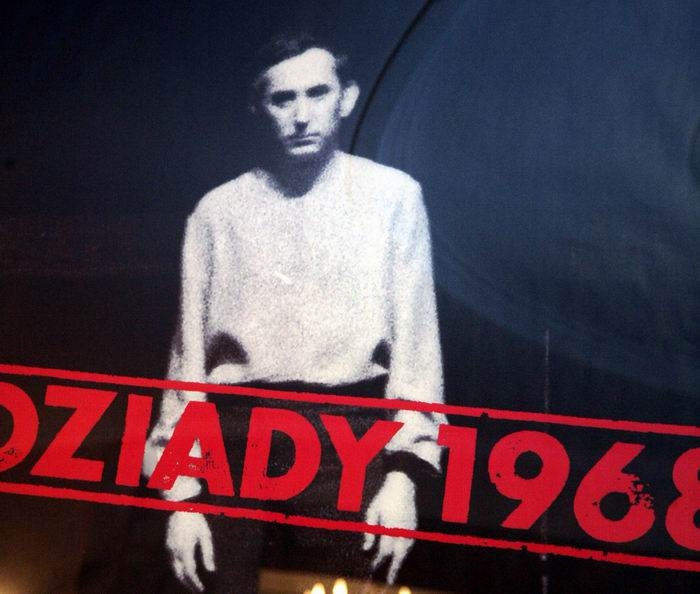|
Artur Eisenbach
Artur Eisenbach (born 7 April 1906 in Nowy Sącz, died 30 October 1992 in Tel Aviv) was a Polish-Jewish historian; an expert on the history of Jews in Poland, member of Polish Academy of Sciences and the head of the Jewish Historical Institute in Warsaw between 1966 and 1968.Antony PolonskyThe YIVO encyclopedia of Jews in Eastern Europe, Volume 1, pg. 463''YIVO Institute for Jewish Research'', 2010. Life Eisenbach studied history briefly at the Jewish Educational Seminary in Vilna and then at the Warsaw University under Marceli Handelsman. Afterwards, he worked at the Society for Jewish Health Care in Poland (Towarzystwo Ochrony Zdrowia Ludności Żydowskiej w Polsce, TOZ). He married the sister of a fellow historian, and later ghetto chronicler, Emanuel Ringelblum. After the Nazi invasion of Poland on 1 September 1939 Artur, along with his wife and child, escaped to his wife's hometown in the east, the small town of Buczacz (now Buchach, Ukraine). However, as a consequence of t ... [...More Info...] [...Related Items...] OR: [Wikipedia] [Google] [Baidu] |
Grob Marii Czarniewicz-Eisenbach-Grave Of Maria Czarniewicz-Eisenbach
Grob may refer to: * Grob Aircraft, a German aircraft manufacturer * Grob fragmentation, an elimination reaction between an electrofuge and nucleofuge on an aliphatic chain * GrOb or Grazhdanskaya Oborona, a Russian punk band * Grob Gob Glob Grod, a characters in the animated series ''Adventure Time'' People with the surname * Charles Grob, professor of psychiatry * Connie Grob (1932-1997), American baseball player * Gertrude Grob-Prandl (born 1917), Wagnerian soprano from Vienna * Henri Grob (1904–1974), Swiss chess master * Jakob Grob (born 1939), Swiss rower * Jeffrey S. Grob, American Roman Catholic bishop * Konrad Grob (1828–1904), Swiss painter * Therese Grob (1798–1875), first love of Franz Schubert See also * Chorvátsky Grob, a village and municipality in western Slovakia in Senec District in the Bratislava region * Slovenský Grob, a village and municipality in western Slovakia in Pezinok District in the Bratislava region * Veľký Grob, a village and municipality i ... [...More Info...] [...Related Items...] OR: [Wikipedia] [Google] [Baidu] |
Soviet Invasion Of Poland
The Soviet invasion of Poland was a military conflict by the Soviet Union without a formal declaration of war. On 17 September 1939, the Soviet Union invaded Second Polish Republic, Poland from the east, 16 days after Nazi Germany invaded Poland from the west. Subsequent military operations lasted for the following 20 days and ended on 6 October 1939 with the two-way division and annexation of the entire territory of the Second Polish Republic by Nazi Germany and the Soviet Union. This division is sometimes called the Fourth Partition of Poland. The Soviet (as well as German) invasion of Poland was indirectly indicated in the "secret protocol" of the Molotov–Ribbentrop Pact signed on 23 August 1939, which divided Poland into "spheres of influence" of the two powers. German and Soviet cooperation in the invasion of Poland has been described as co-belligerence. The Red Army, which vastly outnumbered the Polish defenders, achieved its targets, encountering only limited resistance ... [...More Info...] [...Related Items...] OR: [Wikipedia] [Google] [Baidu] |
Polish Male Non-fiction Writers
Polish may refer to: * Anything from or related to Poland, a country in Europe * Polish language * Polish people, people from Poland or of Polish descent * Polish chicken * Polish brothers (Mark Polish and Michael Polish, born 1970), American twin screenwriters * Kevin Polish, an American Paralympian archer Polish may refer to: * Polishing, the process of creating a smooth and shiny surface by rubbing or chemical action ** French polishing, polishing wood to a high gloss finish * Nail polish * Shoe polish * Polish (screenwriting), improving a script in smaller ways than in a rewrite See also * * * Polishchuk (surname) * Polonaise (other) A polonaise ()) is a stately dance of Polish origin or a piece of music for this dance. Polonaise may also refer to: * Polonaises (Chopin), compositions by Frédéric Chopin ** Polonaise in A-flat major, Op. 53 (, ''Heroic Polonaise''; ) * Polon ... {{Disambiguation, surname Language and nationality disambiguation pages ... [...More Info...] [...Related Items...] OR: [Wikipedia] [Google] [Baidu] |
1992 Deaths
This is a list of lists of deaths of notable people, organized by year. New deaths articles are added to their respective month (e.g., Deaths in ) and then linked below. 2025 2024 2023 2022 2021 2020 2019 2018 2017 2016 2015 2014 2013 2012 2011 2010 2009 2008 2007 2006 2005 2004 2003 2002 2001 2000 1999 1998 1997 1996 1995 1994 1993 1992 1991 1990 1989 1988 1987 1986 Earlier years ''Deaths in years earlier than this can usually be found in the main articles of the years.'' See also * Lists of deaths by day * Deaths by year (category) {{DEFAULTSORT:deaths by year ... [...More Info...] [...Related Items...] OR: [Wikipedia] [Google] [Baidu] |
1906 Births
Events January–February * January 12 – Persian Constitutional Revolution: A nationalistic coalition of merchants, religious leaders and intellectuals in Persia forces the shah Mozaffar ad-Din Shah Qajar to grant a constitution, and establish a national assembly, the National Consultative Assembly, Majlis. * January 16–April 7 – The Algeciras Conference convenes, to resolve the First Moroccan Crisis between French Third Republic, France and German Empire, Germany. * January 22 – The strikes a reef off Vancouver Island, Canada, killing over 100 (officially 136) in the ensuing disaster. * January 31 – The 1906 Ecuador–Colombia earthquake, Ecuador–Colombia earthquake (8.8 on the Moment magnitude scale), and associated tsunami, cause at least 500 deaths. * February 7 – is launched, sparking a Anglo-German naval arms race, naval race between Britain and Germany. * February 11 ** Pope Pius X publishes the encyclical ''Vehementer Nos'', de ... [...More Info...] [...Related Items...] OR: [Wikipedia] [Google] [Baidu] |
Yad Vashem
Yad Vashem (; ) is Israel's official memorial institution to the victims of Holocaust, the Holocaust known in Hebrew language, Hebrew as the (). It is dedicated to preserving the memory of the Jews who were murdered; echoing the stories of the survivors; honoring Jews who fought against their Nazi oppressors and gentiles who selflessly aided Jews in need; and researching the phenomenon of the Holocaust in particular and genocide in general, with the aim of avoiding such events in the future. Yad Vashem's vision, as stated on its website, is: "To lead the documentation, research, education and commemoration of the Holocaust, and to convey the chronicles of this singular Jewish and human event to every person in Israel, to the Jewish people, and to every significant and relevant audience worldwide." Established in 1953, Yad Vashem is located on the Mount of Remembrance, on the western slope of Mount Herzl, a height in western Jerusalem, Above mean sea level, above sea level and ... [...More Info...] [...Related Items...] OR: [Wikipedia] [Google] [Baidu] |
Hebrew University Of Jerusalem
The Hebrew University of Jerusalem (HUJI; ) is an Israeli public university, public research university based in Jerusalem. Co-founded by Albert Einstein and Chaim Weizmann in July 1918, the public university officially opened on 1 April 1925. It is the second-oldest Israeli university, having been founded 30 years before the Israeli Declaration of Independence, establishment of the State of Israel but six years after the older Technion university. The HUJI has three campuses in Jerusalem: one in Rehovot, one in Rishon LeZion and one in Eilat. Until 2023, the world's largest library for Jewish studies—the National Library of Israel—was located on its Edmond Safra, Edmond J. Safra campus in the Givat Ram neighbourhood of Jerusalem. The university has five affiliated teaching hospitals (including the Hadassah Medical Center), seven faculties, more than 100 research centers, and 315 academic departments. , one-third of all the doctoral candidates in Israel were studying at the ... [...More Info...] [...Related Items...] OR: [Wikipedia] [Google] [Baidu] |
Israel
Israel, officially the State of Israel, is a country in West Asia. It Borders of Israel, shares borders with Lebanon to the north, Syria to the north-east, Jordan to the east, Egypt to the south-west, and the Mediterranean Sea to the west. Israeli-occupied territories, It occupies the Occupied Palestinian territories, Palestinian territories of the West Bank in the east and the Gaza Strip in the south-west. Israel also has a small coastline on the Red Sea at its southernmost point, and part of the Dead Sea lies along its eastern border. Status of Jerusalem, Its proclaimed capital is Jerusalem, while Tel Aviv is the country's Gush Dan, largest urban area and Economy of Israel, economic center. Israel is located in a region known as the Land of Israel, synonymous with the Palestine (region), Palestine region, the Holy Land, and Canaan. In antiquity, it was home to the Canaanite civilisation followed by the History of ancient Israel and Judah, kingdoms of Israel and Judah. Situate ... [...More Info...] [...Related Items...] OR: [Wikipedia] [Google] [Baidu] |
Kawalerowicz
Jerzy Franciszek Kawalerowicz (19 January 1922 – 27 December 2007) was a Polish film director, screenwriter and politician, having been a member of Polish United Workers' Party from 1954 until its dissolution in 1990 and a deputy in Polish parliament since 1985 until 1989. Life and career Kawalerowicz was born in Gwoździec, Poland, as one of the few Poles living in an ethnically-mixed Ukrainian and Jewish town. Kawalerowicz's father's family originated from Armenia, originally having the surname Kavalarian. Jerzy Kawalerowicz was noted for his powerful, detail-oriented imagery and the depth of ideas in his films. After working as an assistant director, he made his directorial debut with the 1951 film '' The Village Mill'' ''(Gromada)''. He was a leading figure in the Polish Film School, and his films ''Shadow'' (''Cień'', 1956) and '' Night Train'' (''Pociąg'', 1959) constitute some of that movement's best work. Other noted works by Kawalerowicz include ''Mother Joan of t ... [...More Info...] [...Related Items...] OR: [Wikipedia] [Google] [Baidu] |
Austeria
''Austeria'' (aka ''The Inn'') is a Polish feature film directed by Jerzy Kawalerowicz, produced by ''Zespół Filmowy "Kadr"'' and released in 1983. ''Austeria'' takes place during the opening days of World War I, in the Austro-Hungarian province of Galicia. Tag, played by Franciszek Pieczka, is a Jewish innkeeper whose inn (''austeria'' means inn in the Polish dialect) is located near the border with the Russian Empire. War has broken out and local civilians are fleeing the advancing Russian Army. A number of refugees have taken shelter in Tag's inn for the night. A group of Hasidic Jews from the neighboring village arrive, followed by an Austrian baroness, and a Hungarian hussar, cut off from his army unit. The film is based on a 1966 novel of the same name by Julian Stryjkowski, who collaborated with Kawalerowicz on the screenplay. Cast * Franciszek Pieczka as Tag * Wojciech Pszoniak as Josele * Jan Szurmiej as the cantor * Ewa Domanska as Asia * Wojciech Standello as t ... [...More Info...] [...Related Items...] OR: [Wikipedia] [Google] [Baidu] |
1968 Polish Political Crisis
A series of major student, intellectual and other protests against the ruling Polish United Workers' Party of the Polish People's Republic took place in Poland in March 1968. The crisis led to the suppression of student strikes by security forces in all major academic centres across the country and the subsequent repression of the Polish dissident movement. It was also accompanied by mass emigration following an antisemitic (branded "anti-Zionist") campaign waged by the minister of internal affairs, General Mieczysław Moczar, with the approval of First Secretary Władysław Gomułka of the Polish United Workers' Party (PZPR). The protests overlapped with the events of the Prague Spring in neighboring Czechoslovakia – raising new hopes of democratic reforms among the intelligentsia. The Czechoslovak unrest culminated in the Warsaw Pact invasion of Czechoslovakia on 20 August 1968.Monika Krawczyk (March 2013)Nie zapomnę o Tobie, Polsko! (I will not forget you, Poland). Forum Żyd ... [...More Info...] [...Related Items...] OR: [Wikipedia] [Google] [Baidu] |



